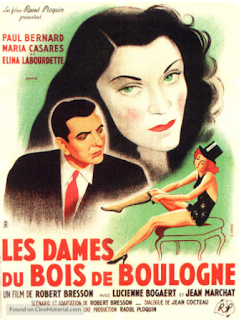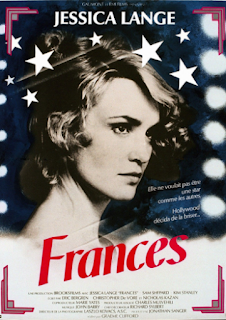Les Dames du Bois de Boulogne (1945)
There are certain actors that are simply born for the camera. Spanish-French actress Marìa Casares , best remembered for her magnificent performance in Jean Cocteau's Orpheus, was one of them. Her face, simultaneously mask-like and expressive, is the key element to the success of Les Dames du Bois de Boulogne, Robert Bresson's second feature film. Bresson, better known for movies like A Man Escaped (1956) and Au hasard Balthazar (1966), went on to become one of the most prominent exponents of minimalist cinema: Les Dames du Bois de Boulogne is among his least remembered work and it's quite easy to see it's an early work - its austere, affected style contrasts strikingly with the director's following production, acclaimed and respected for its authenticity. Still, Les Dames du Bois de Boulogne remains a great film on its own right, a captivating tale of love and betrayal that might not be representative of the director's distinctive style but that is still a movie worth-remembering.
The protagonist of the story is Hélène (Casares), a wealthy, alluring woman living in Paris. She feels her lover, Jean (Paul Bernard, who does some fine work in the movie's least interesting role), is drifting away from her and, feigning that her own feelings have cooled to a friendship, she tricks him into admitting that his love has waned. Jean leaves thinking they have parted on good terms, but Hélène's heartbreak soon turns into a thirst for vengeance: she visits an old, impoverished friend (a rather moving Lucienne Bogaert), whose daugher Agnès (Elina Labourdette) works as a nightclub dancer and prostitute in order to earn them a living. Hélène offers her help to the two women and one day introduces them to Jean, assuring him of their "impeccable" background: her plan is to make Jean fall in love and get married with Agnès and therefore ruining his reputation due to the girl's former profession.
The movie has some pacing issues: despite running shorter than 90 minutes, there are parts in which it lags a bit and others in which it feels a little too rushed. But even in the weakest spots the film still holds your attention thanks to the majestic direction: Bresson creates such a palatable, mesmerizing sense of mood that you can't help but feel fascinated even when the story loses you. The war and the movie's low budget forced him to shot most of it in a studio in Paris, yet Phillipe Agostini's cinematography makes the most out of the production's limited means and it enhances the atmospheric quality already assured by Bresson's touch: his camera work toys beautifully with light, shades and darkness, creating a distinctively beautiful, gloomy visual style within the film's limited scope, and always searches for the actors' reaction and expressions, even amplifying the impact of their performances.
I've read a couple of review dismissing Jean Cocteau's screenplay as excessively artificial: though there is no denying that there is a certain theathrical quality to his script, the elegance and eloquence of his work can not be ignored, as well as the empathy and understanding it has for its characters. It's interesting to watch how in this movie you can admire the work of both Cocteau and Bresson, two artists who went on to become completely different: in his work as director, Cocteau always had a tendency to abstraction and had a profound interest in metaphysics whereas Bresson, in his later production, pursued the utmost authenticity. You can see the diverse styles coming through in this movie and the result is mesmerizing, with Cocteau's intellectualism and Bresson's intimacy forming a perfect blend.
Of course, the movie wouldn't be as effective if it wasn't for Marìa Casares' marvelous performance. Hélène, as most characters written by Cocteau, is a role that could have belonged to a Greek tragedy and Casares accordingly brings grandeur and gravitas to it. She eats the screen alive with her ravishing screen-presence and imbues the part with theathrical intensity. But she also finds the intimate poignancy Bresson strives for. There's a particularly impressive scene in which Hélène is slyly teasing Jean about his feelings for Agnés and he admits his love for the young girl: it's exactly what Hélène wanted, and yet a single tear rolls down her cheek. Casares finds the genuine pain behind her character's manipulative scheming and never loses the character's damaged core even in her most despicable moments. But perhaps the greatest surprise of the film is the performance of Labourdette. Agnés could have easily been a bland victim, but Labourdette breathes life and personality into it. She's charmingly sassy, fiercely independent, smart enough to realize she's being manipulated by Hélène but also aware that, due to her social and economic status, she is powerless against her. As she falls in love with Jean, Labourdette gives an excellent (and also surprisingly modern) portrayal of a woman who doesn't feel shameful about what she had to do to survive but knows what the consequences would be if the truth came out.
The theme of oppression and abuse is recurring in Bresson's production and it can be found here as well: Hélène can afford to manipulate other people because she knows her social status and wealth guarantees her security whereas Agnés can not afford to fight back because she does not have the money nor the reputation to live off on her own - she is bound to the person who is trying to ruin her. Perhaps Bresson was still coming into his own as an artist, but his understanding of human behavior was already there. And in the achingly tender, softly hopeful finale he creates that sort of cinematic poetry that warms your heart.
90/100




I haven't seen this one, sad to say, so I can't really comment on it. I do want to respond to your thoughts on Call Me by Your Name, though. Would I be wrong, and I don't think I'm too out of line for saying this, that you being Italian yourself gave you a greater understanding to the story than someone born across the sea like myself. I'm wondering if I missed anything when watching an admittedly terrific film, though not necessarily an amazing one in my eyes.
RispondiEliminaIn regards to Hammer's performance, he is very strong and I want to see where this role will lead him in the future. Still, I don't think I'd personally replace him with any of the actual nominees, even and especially the Three Billboard's men.
Call Me by Your Name is certainly a very European movie in style and it is full of hommages to European (especially Italian) culture as well so perhaps I felt a little more involved with the story. Also, most of the movie was shot in Crema and Bergamo which are both about a hour away from where I live, so that might have played a factor as well. But really I loved everything about the movie and I thought it was an absolute masterpiece (it’s my third favorite movie of 2017, after Blade Runner 2049 and Phantom Thread).
EliminaI loved Hammer’s performance and I thought it was a surprisingly delicate, layered piece of work. I’d put both him and Stuhlbarg above all of the actual nominees.
Giuseppe may i ask you where you live? Because i live an hour away from Crema and Bergamo too!
EliminaSince you're old blog is in stand by, I'd like to ask you some rankings, best actress from 1995, 1996, 2002, 2014 and 2015 (of the performance you have seen).
One last question, I've seen recently The Best Years of Our Lives, what are your ratings and thoughts on the cast and thoughts on the movie itself?
I live in Como!
Elimina1995
1. Sarandon
2. Stone
3. Thompson
1996
1. Watson
2. McDormand
3. Scott Thomas
2002
1. Moore
2. Kidman
3. Zellweger
I've seen parts of Hayek's performance though not the whole thing.
2014
1. Cotillard
2. Pike
3. Moore
4. Jones
5. Witherspoon
2015
1. Blanchett
2. Ronan
3. Rampling
4. Larson
The Best Years of Our Lives is in my opinion one of the greatest movie ever made. I won't get into too much details as it's definitely a movie I'd love to review in the future, but I thought it was absolutely compelling from start to finish and an incredibly affecting depiction of the aftermath of the Second World War on American society.
Andrews - 4.5 (Could bump him up to be honest. I thought Andrews gave an excellent performance as he does a low-key charm that makes him an endearing and interesting lead throughout, but past that he does such a great job at subtly conveying his character's trauma. He wholly earns his few more emotional moments and he brings such an incredible power to his character's journey: as he slowly begins to adjust to his new life and leave his past behind, I thought he made the transition moving and uplifting. Moreover, his chemistry with Wright is splendid)
March - 4 (A little over-the-top in his hungover scene though there are parts in it in which he is rather funny. Anyway, I thought March gave a strong performance for the most part, making for a rather entertaining presence while also bringing the proper emotional weight to his character who has missed his children's adolescence due to the war. It's a rather touching, subtle performance, particularly nailing his big speech, and he shares a sweet chemistry with Loy, even though I have to admit I would have preferred if Andrews was the one to win the Oscar for this)
Russell - 5 (Heartbreaking work from him. Russell clearly plays a character that mirrors himself but dismissing his performance as "someone playing himself" would be way too easy. For a newcomer, he is completely convincing throughout and his inexperience never shines through. Russell is extremely harrowing in his portrayal of his character's plight but also his unwillingness to be pitied by others. He imbues his character with dignity and strength and makes every step of Homer's adjustment to his new life moving and compelling)
Mayo - 3.5 (She is rather good at portraying her character's charm while expertly conveying her character's vapidness and insensitivity. It's not an especially complex character but she never becomes a one-note villain either and creates a realistically selfish person instead)
O'Donnell - 3.5 (A lovely bit of work from her as she makes her character genuinely and believably sweet. She shares a wonderful chemistry with Russell and she brings the needed warmth and empathy but also quiet strength to the part)
Loy - 4 (She's heartbreaking in the early scenes at portraying her character's joy as she finally reunites with her husband. She doesn't get quite as much to do in the rest of the movie, but she adds a lot to every scene she's in. Through her chemistry with March and their playful interactions, the two actors convey perfectly the history between the characters and she gives an effective portrayal of warmth and support)
Wright - 4.5 (I am quite fond of her in general and I think this is one of her strongest performance. Wright is absolutely luminous in the part and lights up the screen whenever she appears: hers could have been the traditional role of the supportive girlfriend but Wright brings so much life to it. She brings her usual sweetness and radiant charm to the part while also conveying her character's personal plight as Peggy realizes her feelings for Fred but feels unable to act on them. The two actors make their love story extremely touching and compelling throughout, earning their ending as a truly rewarding moment)
Have you seen Bresson's Diary Of A Country Priest (1951).
RispondiEliminaNot yet but I’m interested. Would you recommend it?
EliminaIt has a rather brilliant performance by Claude Laydu.
EliminaI’ll definitely check it out then.
EliminaHey Giuseppe! Sorry it took so long to comment. Your new blog is a great idea, especially since I'll be introduced to lots of new films! Like this one which I haven't seen.
RispondiEliminaI have to say that after reading your thoughts on Chalamet, I'm pretty close to bumping him up to a 5 after a recent re-watch, unfortunately Hammer has gone down for me now to around a 3.
I’m glad you support my idea of the new blog! And I’m thrilled you liked Chalamet more this time around. As for Hammer, what made you downgrade him?
Elimina